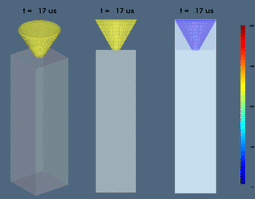The Scientific Computing
Industry, an industry defined by the use of computer technology
in the process of solving scientific and engineering problems,
including fields relating to FEM, CFD, EM, etc.
MATFOR by AnCAD, Inc. is a set of numerical
and visualization libraries developed specially for scientists
and engineers. It is a powerful toolkit built for easy
implementation in the Fortran and C++ development environments.
MATFOR has been applied in engineering, scientific engineering,
and many other fields that have high demands for successful
numerical and graphical solutions. |
|
| |
|
b) Earthquake
response for a 3D frame structure analysis. |
|
|
a) A thin-plate
vibration analysis with an impact force. |
|
|
|
|
|
|
| |
Data courtesy
of Yuan-Sen Yang, National Center for Research on Earthquake
Engineering, Taiwan. |
|
Data courtesy
of Yuan-Sen Yang, National Center for Research on Earthquake
Engineering, Taiwan. |
|
|
|
|
c)
Elastic-wave propagated in a solid media to simulate
the dynamic response isolation of a high-speed train
in Taiwan. |
|
d)
Fracture modeling with a 3D co-rotational explicit finite
element method. |
|
|
|
|
|
|
|
| |
Data
courtesy of Prof. Edward C. Ting/ Chih-Cheng Lin, PhD
Candidate, National Central University, Taiwan |
|
Data courtesy
of Prof. Edward C. Ting/ Chih-Cheng Lin, PhD Candidate,
National Central University, Taiwan. |
|
|
|
e)
Concrete fracture process modeling with a 2D co-rotational
explicit finite element method.
|
| 2.
Fluid Dynamics
|
|
a)
Simulation of turbulence in a fluid field: Computational
Fluid Dynamics (CFD) is used to simulate the
turbulent flow phenomenon caused by the large
Reynolds number. |
|
|
|
|
|
|
|
|
Data courtesy
of Prof. Edward C. Ting/ Yeh Chan Lin, PhD /Chih-Cheng
Lin, PhD Candidate, National Central University, Taiwan. |
|
Data courtesy of Ming-Hsin
Su, AnCAD, Inc. |
|
|
|
|
b)
Simulation of flood diversion in pressure field: Computational
Fluid Dynamics (CFD) is used to simulate the change
of fluid pressure and fluid field influenced by flood
diversion. |
|
c)
Simulation of high pressure reflection: Simulation of
the wave motion phenomenon of high pressure on sharp
obstacle. |
|
|
|
|
|
|
|
| |
Data
courtesy of Ming-Hsin Su, AnCAD, Inc. |
|
Data courtesy
of Dr. Lin and Dr. Huang, Chung-Shan Institute of Science
and Technology, Taiwan |
|
|
|
|
d) Simulation of a 3D inkjet system: Simulation of 3D
miniature fluid spurts on squeeze tube mode of an electric
inkjet system, including spurt generation, dropping,
and impact on the surface. |
3.
Molecular Dynamics |
|
| |
a)
Simulation of phase transition for water in a nano-scale
system by molecular dynamics method. |
|
|
 |
|
|
|
| |
Data courtesy
of Prof. Weng-Sing Huang/ Hsuan-Chung Wu, PhD Candidate,
National Cheng Kung University, Taiwan. |
|
Data courtesy
of Prof. Chin-Hsiang Cheng, Mechanical Engineering,
Tatung University, Taiwan. |
|
|
|
|
b) Simulation of ion perturbation: To analyze the influence
of ion perturbation affected by static electricity by
macromolecule simulation. |
4.
Electromagnetic Analysis |
|
| |
a)
Finite-Difference Time-Domain (FDTD) analysis: Simulation
of the EM-wave spread and reflection based on FDTD. |
|
|
|
|
|
|
| |
Data
courtesy of Prof. Yu-Chang Sheng, Chemical Engineering,
National Taiwan University. |
|
Data
courtesy of Yu-Jen Lin, Precision Instrument Development
Center, Taiwan. |
|
|
|
|
b)
Simulation of EM-Wave scattering on Perfectly Matched
Layer (PML): Simulation of electromagnetic wave scattering
on PML using FDTD analysis method. |
|
c)
Simulation of ground bounce: Simulation of ground bounce
for a signal line through a split power plane by using
single micro-strip line |
|
|
|
|
|
|
|
| |
Data
courtesy of Chun-Hao Teng, AnCAD, Inc. |
|
Data courtesy
of Prof. Ruey-Beei Wu/ Kuang-Hua Hsueh, PhD Candidate
, Department of Electrical Engineering, National Taiwan
University. |
|
|
|
5.
Near-field Optics Calculation
|
|
|
|
| |
a)
Waveguide transmission is simulated in photonic band
gap (PBG) system, in which the energy is exponentially
decayed by destructive interference. |
b)
Analysis of optical thin-film coated micro-lens: Simulation
of complex diffraction and scattering effect caused
by micro-lens in nano-scale or micro-scale. |
|
|
|
|
|
|
| |
Data
courtesy of Pei-Kun Wei, Academia Sinica, Taiwan. |
|
Data courtesy
of Tung-Lung Fu, Precision Instrument Development Center,
Taiwan. |
|
|
|
6.
Heat transfer and geology analysis
|
|
| |
a)
Evolution analysis of ancient ground temperature in
expanding basin: Simulation of ancient ground temperature
evolution in an expanding basin using 3D finite difference
method |
|
|
|
|
|
|
|
|
| |
Data
courtesy of prof. Wei-Hau Wang/ Hsun Hsien, National
Chung Cheng University, Taiwan. |
|
|
|
|
Whatever calculations you are working with, MATFOR can
help you. For easy data visualization, download now
and start benefiting from using MATFOR.
 Try MATFOR Now
Try MATFOR Now
|
|
|
|
|